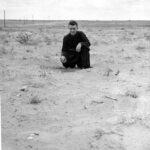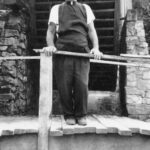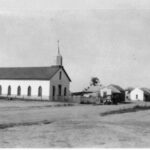Father Edouard was in truth a “man for all seasons”. He was a printer, plumber, electrician, accomplished linguist, eloquent preacher and a lover of the poor. Born in Montreal, Canada, February 20, 1907, he received his early, education in that city and his minor seminary training at St. Anthony’s in San Antonio. In 1927, he began his novitiate in Mission, Texas. Following major seminary studies at De Mazenod Scholasticate, he was ordained a priest on June 3, 1933.
During the next forty years, he labored principally among the Spanish speaking in Harlingen, Rio Grande City, Raymondville, Taylor, Zapata, Elgin, San Antonio and Seymour — all in Texas. Father believed not only in taking care of his people’s souls but also had a concern for their bodily well being. He organized a cooperative grocery store so that they might have food at reasonable prices, installed plumbing so that the people could have running water in their dirt floored homes, brought electricity into their lives, and also repaired their air conditioners and refrigerators.
What Fr. Bastien always did for individual parishioners, he did for the entire town in 1953 when the building of Falcon Dam meant the flooding of their entire community.
“We all readily admit that the new Dam is a good thing; it will help Texas and the Valley tremendously,” the Father Bastien said. “But the poor of Zapata never had a chance from the very beginning.”
A year earlier the I.B.C. (International Boundary Commission) arrived in Zapata to tell the people that their homes, their lands, their businesses had been condemned by the United States, and they must sell to Uncle Sam at the price quoted by three “experts” who would appraise their lands and homes. The prices given by these experts to the bewildered Zapatians were as low as one third of their value. “Why, they couldn’t build a new closet, much less a complete home, with what was offered,” Father Eduardo recalled.
And when the I.B.C. tried to charge rent on these condemned homes, which they had not yet paid for, that’s when this easy-going Oblate started swinging from the sandy floor. With logic, parable, inventive play on words and scathing sarcasm, he wrote letters to the President, Mrs. Eisenhower, Senator Joe McCarthy, Secretary of State Dulles, Senators Price Daniels and Lyndon Johnson, and told them of the injustice and foul play that was going on by the dusty banks of the Rio Bravo.
It boiled down to three main points:
- Father Bastien wanted the government to buy the homes at fair replacement value.
- He asked for salvage value.
- He wanted clear title for the people.
Since much of the land of these people was granted to their families hundreds of years ago by the King of Spain, it would involve long and expensive court proceedings for them to prove that it really was their land.
So the voice of this Oblate was heard in the White House, in the State Department, in Congress, and in Mexico City. Slowly — very slowly — with the help of such men as Rep. Lloyd Bentsen, Jack Porter, and Herman Phleger, the legal advisor, the case began to change.
Washington eventually sent appraisers out who gave fair estimates to the people of Zapata for their land and homes.
Worn out by his ceaseless labor and constant solicitude for the poor, he went to his eternal rest in Brownsville Hospital, May 30, 1972.
The Southwestern Oblate Historical Archives are located on the campus of Oblate School of Theology. For more information, including how to schedule an appointment, please visit the Archives page.
Certificate in Oblate Studies
If you want to learn more about the Missionary Oblates of Mary Immaculate, their charism, and their founder, St. Eugene de Mazenod, you may be interested in the Certificate in Oblate Studies.



